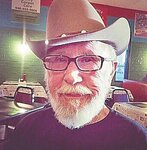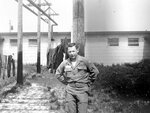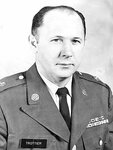


Almost five years have passed since former military veteran Gerald Trottier passed away.
His wife, Granbury resident Jean Trottier, and grandson, Nicolas Fleming, continue to honor Gerald for his service in the military every year for Veterans Day and Memorial Day.
In 2009, when Fleming was attending college at Texas Tech University in Lubbock, he interviewed his grandfather and wrote an essay about Gerald’s time in the military, when he fought two years and two tours in Vietnam.
“It was really interesting because a lot of the information that he gave me in the interview process was a lot more than he would have ever given me as a grandson, so the dynamic shifted quite a bit when he knew what it was for,” Fleming said. “When he was able to start telling some of his stories and start getting into what was actually going on in his time in the military, he opened up quite a bit more, so it was really interesting to see another side of him.
“I was very close to my grandparents; I thought that I knew them backwards and forwards, but then during that interview process, he let his guard down quite a bit more, and opened up about things that he had never talked about previously with any of the other grandchildren or even like, my mom, for that matter.”
Fleming described his grandfather as “family focused” and said he cared deeply about his family in every aspect.
“He was wonderful to be around and always curious, even when I was doing very dumb things as children are (prone) to do and thought that they were super interesting, he would always give me his attention,” he said. “He was very mindful and cognizant of the fact that I was his grandchild, so he made a special effort to make sure that I was included, make sure that I was heard and make sure that I felt as though I was way more important than I probably was at the time.”
Fleming’s essay is included below:
Vietnam: A Different War
History looks back at The Vietnam War as an unpopular one; it was filled with movements of anti-war and anti-military. A feeling of negativity and lack of support swept the United States citizens. These people weren’t just against the government that declared the war, but also the troops that were merely trying to survive, trying to protect the freedoms that we as Americans enjoy daily. As Gerald Trottier said, “We were treated better in Vietnam than we were at home.”
Like many young men back in the early 1950s, Gerald Trottier entered the military service as an inexperienced youth looking for something new. That type of adventure didn’t come without its own sacrifice and apprehension. When asked what his reaction was to joining the military, “scared to death, straight off the farm right into the military.” Little did he know joining in 1953 that he would stay in service long enough to become a master sergeant, long enough to gain memories that would last a lifetime, long enough to change his entire life.
Trottier’s military occupational specialty was aviation. He served from 1953-1976, fought two years and two tours in Vietnam — the first with the 7th Aircraft Squadron with Blackhawks, the second with the 498th Dustoff Division. The 498th Dustoff was a medical evacuation unit in which they landed on battlefields to pick up the injured and take them to medics. “It was dangerous and continuous. In one year, we lost 26 helicopters and many good crew along with them.”
The training back in the days of Vietnam was not near as technologically advanced or polished as it is today, but that didn’t change how prepared each individual was for their part in the fighting. “The training kept on going, we kept learning. Every day was training. We went to a lot of schools, and we were pretty well prepared for what we had to do.” His specialized training came in forms of infantry, artillery and then finally with the aviation maintenance program, all of which would become crucial in his survival during Vietnam.
Traveling wasn’t a new thing for an Army man who had been stationed all over the world. Before going to Vietnam, he had been on tours in Germany, England and many different cities in the United States. But even with all of that under his belt, it still didn’t make going to war easy; there was still fear and apprehension felt by all involved.
Everyone has pre-game jitters before something important, but the intensity one must feel before going into a war zone has to be overwhelming. My grandfather, Gerald Trottier, was in some ways excited about this new experience bestowed upon him. “It was an adventure; it took 33 days to get there on boats. Because of the Tet Offensive we couldn’t get into port, so we went to a bay around Saigon board LCV’s (lightweight combat vehicles), hit the beach and slugged it through onto land.” This was exciting to him because there wasn’t time to be scared in battle. Every day was an adventure and every day could be your last. “About six hours of war was fear. From then on, it wasn’t an issue. Getting shot at was a daily thing, but you couldn’t let that get a hold of you, just had to do your job from start to finish.” In those years of service, the days seem to run together. “I can’t remember the name of one mission.” This happens when you are constantly in the air, receiving more and more missions by the hour, not resting, waking up at sunrise and working until midnight.
War brings out many intense feelings and emotions, but most of them cannot be understood by people not affiliated with the war efforts. One of which is firing upon an enemy, losing a friend to enemy fire or not knowing whether you will be alive to see the coming of the next day. All of these emotions are felt by the soldiers involved in war daily. One of the most personal things a soldier has to do, and subsequently live with, is the duty to fire a weapon at another human being. “That’s what you were trained to do. War was war. It was a game and the game was usually won by the team that killed the most enemies.” The game that soldiers are involved in is a savage one, but it was the duty of each soldier. “I wasn’t happy about it, but you were glad it wasn’t you, wasn’t easy to do, but got used to it. I wouldn’t want to do it again, but I would if I had to.” That type of dedication is shared by most that served in the military; that is why it’s so hard to understand how some people could criticize them for doing their jobs with more dedication than most will ever know.
Along with warfare, shooting and artillery there comes injury. It’s experienced by the soldiers, it’s part of combat, but it will never be the end all be all. “I should have gone to the medics, and if I would have, there would have been two Purple Hearts waiting for me, but I wasn’t there for that. I just wrapped it up and went on.” With an armed forces unit filled with that much heart and valor across the board, it is unbelievable that they had to come home to so much hate and ridicule from the very people they were protecting. Many men lost their lives protecting the freedoms of America in Vietnam, and while this was happening the citizens of our great nation had the audacity to throw things at the men coming home from or leaving for war. The feelings of the American people affected the morale of the soldiers overseas. “The morale was very high until the ending of the war, when there was no support from the American people or the American government. We as soldiers had to rally around each other, because the people back in the United States weren’t going to support us in any way.”
When exactly did the war hero die? Sometime after World War II and before the end of Vietnam the American people changed their minds about the men protecting their freedoms. Maybe it was because we stopped fighting evil powers and started fighting politics, maybe it was because the line between good and bad was getting thinner and thinner, or maybe it was because we were no longer underdogs; we were now a legitimate world power. Whatever the reason was, a change happened. America stopped caring about soldiers as human beings and treated them as outcasts, as less than human. Even on the battlefield enemy soldiers had more compassion for each other. “In medical evac we picked up anyone and everyone that was hurt Even if they were the enemy, they were still human.”
Trottier had two different tours during Vietnam; therefore, he experienced leaving for Vietnam and coming back from Vietnam two different times. His experiences are probably close to the same as many soldiers had, and those experiences will not easily be forgotten. “I landed back home in my uniform, and (the harassment) was so bad that I immediately took my bag, went to the bathroom and changed into the only civilian clothes I had.” It is unfathomable that the American people could be that incredulous to their country’s own military. The same military that was fighting the war efforts commanded to them by America. War was a soldier’s job, and the soldiers were trying to finish their job as quickly and as effectively as they possibly could. It was known that adversity and resistance would be part of the war in Vietnam, but the soldiers weren’t thinking they would have to be afraid of their own people as well.
People will question wars. People have minds and use them. People have been taught since grade school that fighting never solved anything, but in a world where some fight to protect freedom and some fight to destroy freedom, wars will happen. When they happen, the public must rally around their troops. In Vietnam the complete opposite happened; the people and government turned their backs on the very forces entrusted to protect them. That was in one word, unbelievable. “...it was shameful how they treated us coming back from battle. I will never really forget that...disgraceful. How could your own people do that to you?”
War is not a wonderful thing. It isn’t pretty, it isn’t romantic, but it happens and when it does, people die. Americans just like you and me give their lives to protect millions of people they have never even met. It is a double-edged sword that military personnel carry. At one end, they protect the liberties that make America free and for that we are grateful, but the freedoms they protect let civilians protest their jobs as soldiers when America is unhappy about war.
Vietnam was a different war. It wasn’t supported from beginning to end. Media outlets let the American people know just how terrible this war was. It is understandable that people wanted it to end after losing so many young men and hearing so many horrific tales, but what will never make sense is that people could still look at themselves in the mirror after denouncing the very soldiers risking their lives daily to try and put an end to it — that those civilians learn to hate such a powerful entity, an entity that gave us our freedom, kept our freedom and continued to die for our freedom. War should never be a popularity contest. After WWII the veterans were received back home with wide open arms. The public loved what they did in Europe, but upon returning home from Vietnam, the veterans were called names. They were in some ways denounced from society. “There was nothing to be proud of when your own people were ridiculing you, calling you names. That was when the morale of the Army really started to decline.”
A whole generation of men and women knew what they were doing in Vietnam was the right thing, but that didn’t make it any easier, or more popular. Wars have to be one of the hardest things to deal with; it is probably the closest thing to hell that anyone on this planet will ever see. That stress is enough to change a man entirely; couple that with the fact that nobody wanted to hear what people went through in Vietnam, and it is a wonder how we have any sane veterans of Vietnam left today. Many of these men came from Vietnam with no one to turn to, no one to share their hardships with, so they turned to something else. Alcohol was the weapon of choice for many; it is how many dealt with being outcast from a society they once called theirs. It is sad how easily people can be brainwashed by few, how people of an entire nation can learn to hate soldiers for fighting an unpopular war.
I cannot imagine hating a soldier. Each soldier has given up so much for their country and patriotism is how we show that we appreciate their sacrifice. No one will agree with everything our military does, every war we fight or every conflict we should happen to be in, but what everyone can do is support their military. Through the good times and the bad, the ups and the downs, people should always respect and honor the individuals that perform acts of heroism every day.
I will forever give thanks to any man or woman who gave or risked their life to assure that mine could be free and pure. The names of every Vietnam veteran should live in infamy. Yes, there are still heroes, and in my eyes, Master Sergeant Gerald Trottier will forever be one of them.